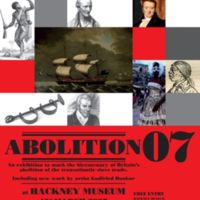
Abolition 07
Hackney Museum's Abolition 07 exhibition told the story of British involvement in the transatlantic slave trade, the resistance to it, and its abolition, and in particular emphasised the involvement of Hackney's residents in the abolition movement. The display included new artwork by Godfried Donkor in collaboration with young Hackney artists. A film of interviews with Hackney residents, Hear My Voice, was produced. Over 1200 children from Hackney Primary Schools took part in poetry workshops at the museum with poets Adisa and Baden Prince. Their poems and responses were published in the booklet 'And Still I Rise'.
The research into Hackney's connections to the transatlantic slave trade continued in 2013-2015 with 'Local Roots / Global Routes', a collaborative project between Hackney Museum and Archives and the Legacies of British Slave-ownership project.
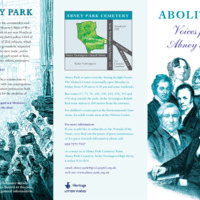
Abolition Voices from Abney Park
Abney Park is a non-denominational cemetery in Stoke Newington, London. The walking tour Abolition Voices from Abney Park was developed to highlight the individuals connected with the abolition of slavery buried there, including the Baptist missionary Reverend Thomas Burchill (associated with Samuel Sharpe and the 'Baptist War' in Jamaica), Reverend Newman Hall and Reverend James Sherman (both associated with abolition in the USA). The grave of Joanna Vassa, daughter of Olaudah Equiano, was identified and restored. The monument to Joanna Vassa was designated Grade II listing by Historic England in 2008 as part of the bicentenary commemorations. There were accompanying talks and school workshops. Abney Park Cemetery Trust was also responsible for the carving of a new memorial stone for the writer Eric Walrond.
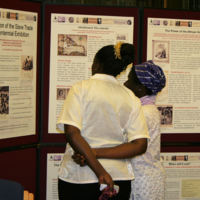
Abolition of the Slave Trade Bicentennial Exhibition
This exhibition held by the Cadbury Research Library: Special Collections at the University of Birmingham included material from the archives of the Church Missionary Society held there, and some of its rare book collections. The accompanying information boards are featured here. The exhibition focused on the role of religion in the abolitionist movement, the power of the African voice in literature, and the role played by Birmingham residents in the anti-slavery campaigns. A booklist on anti-slavery publications held at the library was also produced. The exhibition was part of a University-wide initiative, with additional involvement from academic departments and the Guild of Students. An online exhibition was also produced in collaboration with the Library of the Religious Society of Friends: 'Quakers and the path to abolition in Britain and the colonies'.
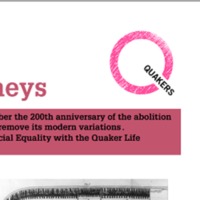
Quakers and the path to abolition in Britain and the colonies
The Society of Friends expressed its formal opposition to the slave trade in 1727, and from that date were vocal opponents of transatlantic slavery. A virtual exhibition of archived resources, ‘Quakers and the path to abolition in Britain and the colonies’, was launched online to commemorate the bicentenary. It traced the history of the anti-slavery movement from its Quaker beginnings and highlighted key events in the Quaker history of opposition to the slave trade, and was primarily based on material from the Library at Friends House. The exhibition also explained the important role played by Quaker women abolitionists through writing and poetry. The Quakers pioneered contemporary tactics such as boycotting, petitions, leafleting and poster campaigns.
Other resources to help people find out more about the bicentenary included ‘Abolition Journeys’, developed by Quaker Life Committee for Racial Equality with the Quaker Life Children and Young People’s Staff Team, designed to help people of all ages remember the slave trade and work to abolish its modern variations.
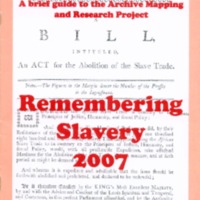
Remembering Slavery Archive and Mapping Project
Remembering Slavery 2007 involved museums, galleries and other cultural organisations across the North East of England in a programme of exhibitions, events, performances, lectures and activities to explore the themes of slavery and abolition, and identify connections with the region.
The Remembering Slavery Archive Mapping and Research Project, led by the Literary and Philosophical Society in Newcastle and assisted by local history groups, uncovered a large amount of archival material in the region’s institutions, exposing many hitherto unknown links between the North East and the slave trade. The participating record offices and libraries were Tyne and Wear Archives Service, the Literary and Philosophical Society Library, the Northumberland Record Office and the Robinson Library’s Special Collections at the University of Newcastle upon Tyne. This reassessment of the North East’s involvement in slavery and the slave trade led to new published research, including John Charlton's 'Hidden Chains: the Slavery Business and North East of England 1600-1865'. There was also a lecture programme at the Literary and Philosophical Society, including talks by Professor James Walvin. Several of the project volunteers published essays based on their research in 'North East History 39' (North East Labour History Society, 2008). The North East Slavery and Abolition Group was established among the project volunteers, and further work on slavery and abolition was included in the Society’s North East Popular Politics project (NEPPP), 2010-13. Much of the material found in the 2007 project has been loaded onto the NEPPP database.